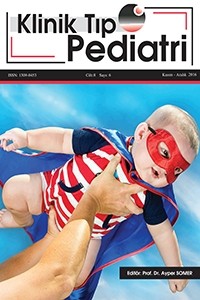Çocuklarda Akut Tonsillofarenjit
ÖzÇocuk doktorlarına başvuru nedenlerinin en büyük kısmını akut tonsillofarenjit oluşturmaktadır. Yüzyıllardır bilinen bir hastalık olmasına rağmen günümüzde halen tanıve tedaviyle ilgili ciddi yanlışlar yapılmaktadır. Bu yanlışlar uygunsuz ve fazla miktarda antibiyotik kullanımına neden olurken, beraberinde yüksek maliyet ve antibiyotik direnci gibi önemli sorunları doğurmaktadır. Birçok solunum yolu enfeksiyonlarının etiyolojisinde olduğu gibi, tonsillofarenjitin etiyolojisinde de virusler birincisırada yer almaktadır. Çocuklarda A grubu beta hemolitik streptokoklar (AGBHS) bakteriyel tonsillofarenjitin en sık nedenidir. AGBHS tedavi edilmediğinde süpüratif venonsüpüratif komplikasyonlara neden olabildiğinden klinik ve laboratuvar olarak ta-nısını koymak önemlidir. Tanıda kültür altın standart olup, kısa sürede sonuçlanan destekleyici tanısal yöntemler de vardır. Tedavide penisilinler direncin gösterilmemiş olması ve dar spektrumları nedeniyle birinci seçenek olup, özel durumlarda farklı ajanlar tercih edilebilmektedir.
Anahtar Kelimeler:
tonsillofarenjit, penisilin, A grubu beta hemolitik streptokok
Acute Tonsillopharyngitis
AbstractAcute tonsillopharyngitis is the most common cause of hospital admission in pe-diatric practice. Though this disease is well known, there are still many mistakes about diagnosis and treatment of this disease. These mistakes cause overuse of antibiotics, high treatment cost and also induce antibiotic resistance. Viruses are the leadingcause of tonsillopharyngitis. Bacterial tonsillopharyngitis is mostly caused by Group A beta hemolytic streptococci (GAS) in childhood. Insufficient treatment of GASpharyngitis may cause suppurative and non-suppurative complications. Throat culture is gold standart for diagnosis and there are also rapid supportive tests. Penicilline is the best way to treat GAS pharyngitis because it has narrow spectrum, it ischeap and resistance is shown yet. Inspecial cases other antibiotics may be used.
___
- Kaynaklar 1.Hayden GF, Ronald B. Turner. Acute Pharyngitis. “KliegmanRM, Stanton BF, St. Geme JM, Schor NF, Behrman RE (eds).Nelson Textbook of Pediatrics. 19th ed.” s.1439-1440 , Phi-ladelphia: W.B. Saunders Company (2011). 2.American Academy of Pediatrics. Group A streptococcal in-fections. In: Red Book: 2012 Report of the Committee on In-fectious Diseases, 29th, Pickering LK (Ed), American Academyof Pediatrics, ElkGroveVillage, IL 2012. p.668. 3.Shulman ST, Bisno AL, Clegg HW, et al. Clinical practice gui-deline for the diagnosis and management of group A strep-tococcal pharyngitis: 2012 update by the Infectious DiseasesSociety of America. Clin Infect Dis 2012; 1279-1282. 4.Bölüm 15: Gram pozitif koklar. ‘‘Warren Levinson ve ErnestJawetz, çeviri editörü: Prof. Dr. Tuncay Özgünen. Tıbbi mik-robiyoloji ve İmmünoloji, 7. Baskı’’. Ankara, Güneş Kitabevi(2004); 102-109. 5.Kronman MP, Zhou C, Mangione-Smith R. Bacterial preva-lence and antimicrobial prescribing trends for acute respira-tory tract infections. Pediatrics 2014; 134: 956-65. 6.Lin MH, Fong WK, Chang PF, et al. Predictive value of cli-nical features in differentiating group A beta-hemolyticstreptococcal pharyngitis in children. J Microbiol ImmunolInfect 2003; 36: 21-25. 7.Bisno AL. Acute pharyngitis. N Engl J Med 2001; 344: 205-11. 8.Gerber MA. Diagnosis and treatment of pharyngitis in child-ren. Pediatr Clin North Am 2005; 52: 729-47. 9.Carroll K, Reimer L. Microbiology and laboratory diagnosisof upper respiratory tract infections. Clin Infect Dis. 1996;23:442-448. 10.Cohen R, Haas H, Lorrot M, Biscardi S, Romain O, Vie Le SageF, Hentgen V, Grimprel E..Antimicrobial treatment of ENT in-fections. Arch Pediatr. 2017; 24: 9-16. 11.Brennan-Krohn T, Ozonoff A, Sandora TJ. Adherence to gui-delines for testing and treatment of children with pharyngi-tis: a retrospective study. BMC Pediatr. 2018; 18: 1-7. 12.Vazquez MN, Sanders JE, Wilson B. Diagnosis and managementof group A streptococcal pharyngitis and associated complica-tions [digest]. Pediatr Emerg Med Pract. 2017; 21;14: 1-2. 13.Baltimore RS. Re-evaluation of antibiotic treatment of strep-tococcal pharyngitis. Curr Opin Pediatr 2010; 22: 77-82.
- ISSN: 1309-0453
- Başlangıç: 2009
- Yayıncı: Selen Medya Yayıncılık Tanıtım ve Organizasyon Hizmetleri
